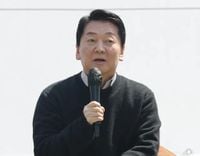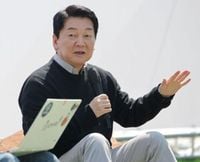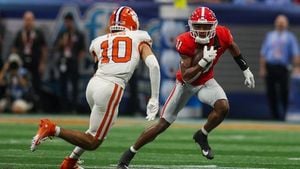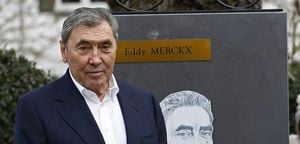Ahn Cheol-soo, a prominent candidate in the People's Power Party's presidential primary, has made a bold appeal to fellow candidates Han Duck-soo, Kim Moon-soo, and Han Dong-hoon, urging them to withdraw from the race to prevent what he refers to as the "Lee Jae-myung era." In a series of posts on social media, Ahn expressed his concerns over the implications of their candidacies, asserting that they align with Lee Jae-myung's strategy to frame the election as a contest between Lee and incumbent President Yoon Seok-yeol.
On April 26, 2025, Ahn took to Facebook to outline his position, stating, "The candidacies of Han Duck-soo, Kim Moon-soo, and Han Dong-hoon are complying with Lee Jae-myung's strategy." He emphasized that if Han Duck-soo were to enter the race, it would not only be futile but would also play directly into the narrative that the Democratic Party is trying to establish.
Ahn's criticisms of Han Duck-soo were particularly pointed. He labeled him as the "most suitable opponent" for the Democratic Party's framing of the election and described him as a "100% losing candidate." This stark assessment reflects Ahn's conviction that the current political landscape necessitates a more strategic approach to candidate selection among the opposition.
In addition to his comments about Han, Ahn also took aim at Han Dong-hoon, criticizing his performance in debates. He remarked, "The debate was really absurd," highlighting his belief that Han's previous affiliations with former President Yoon Seok-yeol have clouded his candidacy.
Ahn's broader message centered on the need for rational decision-making within the party. He stated, "Now we have to regain reason and choose a candidate who can truly defeat Lee Jae-myung." This statement underscores his belief that the stakes are high and that the party must select a candidate capable of challenging the Democratic Party effectively.
He further elaborated on the consequences of allowing figures from the impeached administration to run, arguing that it would mean voluntarily stepping into a trap set by Lee Jae-myung, whom he referred to as the "executioner" of the opposition. Ahn's rhetoric suggests a deep-seated concern that the current candidates may inadvertently support Lee's political ambitions.
In a separate Facebook post, Ahn directed his criticism toward another candidate, Hong Joon-pyo, warning of what he called the "Myung-tae-kyun risk"—a term he used to describe the potential pitfalls associated with Hong's candidacy. Ahn stated, "Even if there are no allegations against you, the risk exists," implying that the Democratic Party holds significant leverage with information that could be used against their opponents.
He also pointed out that Hong's statements about collaborating with Lee Jae-myung's Democratic Party were deeply problematic. Ahn asserted, "Lee Jae-myung is not someone to be compromised with but a criminal to be blocked," reinforcing his stance that the party must unify against Lee's influence.
Ahn's call for unity among the candidates is not just about personal ambition; it’s about the future of the party and its ability to present a viable alternative to the Democratic Party. He has taken a decisive stance, claiming, "I have made the decision to unify to prevent Lee Jae-myung's consolidation of power." This statement reinforces his commitment to rallying support around a single candidate who can effectively challenge Lee.
As the primary progresses, Ahn's insistence on a strategic withdrawal from the race by his fellow candidates reflects a growing concern within the People's Power Party about the potential for a divided front against Lee Jae-myung. His rhetoric is not only aimed at persuading his rivals but also at galvanizing support from the party base, who may be apprehensive about the implications of a divided candidacy.
The political landscape in South Korea is increasingly complex, with the People's Power Party facing significant challenges in the upcoming election. Ahn's remarks highlight the urgency of the situation, as he implores his fellow candidates to consider the broader implications of their decisions on the party's chances of success.
In conclusion, Ahn Cheol-soo's appeal to Han Duck-soo, Kim Moon-soo, and Han Dong-hoon to reconsider their candidacies is rooted in a strategic vision for the People's Power Party. His insistence on unity and rational decision-making underscores the high stakes of the upcoming election and the necessity for the opposition to present a cohesive front against Lee Jae-myung's Democratic Party.





